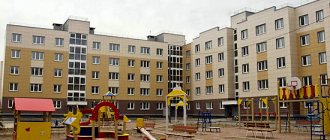The concept of social hiring
What does social hiring mean? Unfortunately, the state or territorial housing stock is not so developed as to provide square meters for everyone. Therefore, the opportunity to obtain social housing is not given to everyone. This right belongs to:
- persons who took part in eliminating the consequences of the Chernobyl disaster;
- World War II veterans;
- disabled people of groups 1 and 2.
Orphans released from orphanages and boarding schools should be provided with social housing in the first place .
They are allocated one-room apartments with a small living space.
The size of the living space and the number of rooms for family tenants are calculated in accordance with the standards approved in a particular municipality.
Social rent allows you to live and use all utilities within a certain living area. But neither the tenant nor other tenants have the right to sell it, give it away, or bequeath it by inheritance.
Who is the main employer?
Most often, not just one person, but a whole family moves into a municipal apartment. But only one member of the family being settled acts as an applicant when drawing up the agreement . Documents and utility bills are drawn up in his name. It is he who is responsible to the municipality for the housing provided.
Previously, such a person was called a responsible tenant; after the latest edition of the housing code, the name was simplified to a tenant. The essence remains the same.
Employer status is:
- Responsibility for compliance with the agreement and the actions of the entire family.
- Representative functions in all matters related to housing.
How to become one?
In order to become the main tenant in a municipal apartment, you need to enter into a social tenancy agreement in your name. This can be done by agreement with other family members. If an agreement cannot be reached, the housing department can appoint a tenant.
How to file a claim?
How to file a claim to become the main one? In accordance with Article 672 of the Civil Code and Article 82 of the Housing Code, any adult and capable family member can become a tenant with the consent of the existing tenant and other residents. Therefore, it is legally possible to ask the municipality, represented by the housing department, to renew the contract. How to change employer? To do this, submit a corresponding application.
Article 82 of the RF Housing Code. Changing the social tenancy agreement for residential premises
- Citizens living in the same apartment, using residential premises in it on the basis of separate social tenancy agreements and united into one family have the right to demand that any of them conclude one social tenancy agreement for all residential premises they occupy.
- A capable family member of the tenant, with the consent of the remaining members of his family and the landlord, has the right to demand recognition of himself as a tenant under a previously concluded social rental agreement instead of the original tenant. The same right belongs in the event of the death of the employer to any capable family member of the deceased employer.
However, such requests are not always satisfied. Therefore, you can file a claim for the same in the district court at your place of residence. There are standard templates for such applications, so submitting one will not be difficult.
The following documents are attached to the statement of claim:
- Copies of passports of all participants.
- Registration certificates.
- A copy of the personal account.
- A copy of the latest receipt, which confirms the absence of debt.
- Social rental agreement for premises.
- If the previous employer has left or died, you must provide a certificate of deregistration.
- Receipt for payment of state duty.
- Depending on the specific situation, other documents may be needed.
Rights and obligations
On the one hand, the law says that all registered and living family members specified in the social tenancy agreement have equal rights to this premises, bear the same responsibility for compliance with the terms of the agreement, and have the same responsibilities. At the same time, Article 67 of the Housing Code stipulates the rights and obligations of the person specified in the contract as the tenant.
- Accommodate third parties in housing.
- Conclude a lease agreement with other citizens for part of the occupied living space (read about whether a municipal apartment can be rented out here).
- Accommodate someone for a while.
- Demand that the landlord replace the apartment if the existing one does not meet the standards.
- Demand compliance with obligations from the landlord, namely, provision of utilities, major repairs, etc.
- Obliged to ensure the safety of the apartment and other property entrusted to him.
- Use the premises only for living in it.
- Do routine repairs with your own money.
- Maintain the normal condition of the home.
- Pay utility bills on time.
Rights of other residents
What are the rights of a council housing tenant? Article 76 of the Housing Code indicates the possibilities of the tenant in relation to non-privatized living space. This includes:
- the right to move in other third parties, except those who officially live there under a social tenancy agreement;
- exercise the right to sublease and re-let the allocated part of the living space or the entire apartment (only after the consent of the municipality);
- require the owner to carry out repair work and timely provision of housing services;
- allow third parties to reside on a temporary basis (as agreed by the parties);
- exchange this type of real estate for another or demand its replacement based on special circumstances specified in Article 72 of the Housing Code of the Russian Federation.
Any changes must be made to the social tenancy agreement for the apartment and not only with the consent of the municipality, but also of other people living in it who have acquired legal capacity. If you want to move someone in or register someone in this apartment, you will need to obtain permission from the owner. An exception is registration for minor children in a non-privatized apartment. The state can refuse to register new residents only due to a violation of the amount of space per person.
Now let's look at the rights of other tenants in the event of the death of the tenant. What a family member living with the main tenant can do after his death:
- Renew the social tenancy agreement for yourself.
- Go through the privatization procedure.
Even if the tenant changes, no other resident of the municipal apartment can be registered as a new tenant.
To renew the contract, you must have the permission of the other residents living in the apartment, as well as the landlord, that is, a departmental or municipal body. Privatization implies the appropriation of state property, that is, the property will be transferred to your personal property, which you can dispose of without the consent of government authorities. However, privatization cannot be carried out without re-registering the social tenancy agreement.
Is it necessary to re-register a social tenancy agreement for residential premises?
Good afternoon.
There is a social rental agreement for a non-privatized apartment. The employer under the contract is my grandmother, who is no longer 15 years old.
There are two people registered in the apartment today: me and my mother (grandmother’s daughter). Part 1 of the agreement also contains this note: “which will be used for living by the Tenant and his family members: daughter and me (listed by last name).” My mother is not yet planning to privatize the apartment (she has a psychological illness and is already beginning to develop a manic syndrome that someone will take the apartment away and it’s better not to do anything).
The question is, was it necessary to re-register the social tenancy agreement after the grandmother’s death and can this be done now? (My mother assures that she went somewhere with the documents a long time ago, she was told that everything was fine, the document is eternal and nothing needs to be done) Will this document, which has not been reissued, be suitable for privatizing an apartment if all parties agree?
We recommend reading: The driver is charged a fine when changing the registration of his place of residence
What difficulties will there be for me in the future with the privatization of an apartment if my mother passes away, under this agreement executed in the name of my grandmother?
(my mother’s condition is deteriorating sharply, I’m afraid of being left without housing if nothing is done) November 15, 2020, 08:50, question No. 2167627 Alexander, Moscow 400 cost of the issue question resolved Collapse Online legal consultation Response on the website within 15 minutes Answers from lawyers ( 4) a fee of 30% was received 10.0 Rating Pravoved.ru 11299 answers 5560 reviews expert Chat Free assessment of your situation Lawyer,
Novosibirsk Free assessment of your situation
- 10.0 rating
- expert
Hello, Alexander. You have the right, but not the obligation, to re-register the Social Tenancy Agreement for yourself now with the consent of your mother, or for your mother. After the death of your mother, you will have the right to re-register the contract in your name.
During privatization, I believe you may be required to put your documents in order, re-register the Social Tenancy Agreement in your name, and exclude deceased citizens from it. Housing Code Article 82.
Death of a Tenant
The death of the employer does not at all mean the termination or termination of the social tenancy agreement.
The right to use the premises will pass to one of his capable family members. Persons registered in the specified housing do not lose the right to continue living there with the death of the tenant.
Article 82 of the RF Housing Code states that after the death of a social housing tenant, any of his close relatives writes a petition to the authorized body.
There you should demand to recognize him as a responsible tenant on the basis of a previously concluded apartment rental agreement.
It is very important that the following condition be met: all other family members must agree with the new candidacy. This is done by writing a collective statement.
When there is a difference of opinion, the issue will be dealt with through litigation. Since this will require spending time and money, it is recommended to reach an agreement out of court and not take everything into the legal realm.
Let's take a step-by-step look at how a new tenant is appointed:
- Family members of the deceased tenant come to a unanimous agreement on who should be designated as the new tenant.
- They also draw up a written collective statement, which is then submitted to the Housing Department or the relevant department of the executive authority. The personal presence of each family member or notarized consent will be required.
- In addition to the application, the following are provided: a copy of an extract from the house register, passports of all residents of the living space, a social tenancy agreement, and a death certificate of the tenant of the premises.
- Some time after the new agreement is approved and signed, receipts for utility bills will be sent to the new tenant.
You must remember to sign the previous tenant out of the premises. This is done at the passport office on an application accompanied by a death certificate.
We discussed above what happens when a former tenant has a family or close relatives living with him. But how does the situation develop if the tenant lived alone in a separate municipal apartment?
In this case, after his death, the social tenancy agreement is automatically terminated, since usually the death of one of the parties is a reason for the invalidity and irrelevance of almost any civil law transaction.
Then, by decision of the executive authority, the apartment is transferred to another family or another citizen.
What happens to a non-privatized apartment after the death of a tenant?
An apartment that a tenant receives on a temporary basis from the state is called municipal housing. A non-privatized or municipal apartment belongs to the state until privatization. Until the tenant of the property carries out privatization, he cannot sell the apartment, rent it out or inherit it to relatives, since the owner is the local authority. What then happens to a non-privatized apartment after the death of the tenant?
Article 82 of the Housing Code defines the rights and obligations of residents of municipal property.
After the death of the tenant, the apartment does not change its status. Therefore, there are two possible outcomes in relation to a state-owned non-privatized apartment:
- The first is to re-register the social tenancy agreement for another family member who lived with the deceased.
- The second is to transfer it to the state and move other people in need there.
If there are interested parties who want to renew the social tenancy agreement for a municipal apartment, then it is very important to decide on the first point. It says that this right extends to family members. Therefore, you first need to determine who is a family member? Many people confuse this concept with relatives. This category of citizens is not excluded, however, according to the Housing Code, a “family member” is understood as a category of people who are registered in the same living space and fulfill mutual obligations towards each other. Accordingly, the following persons can re-register rights to reside in a municipal apartment:
- spouse, even if they are divorced, but continue to live together or are registered in a rental agreement;
- any relative who lived in the apartment with the state tenant. housing;
- any persons specified in the social tenancy agreement.
If several people lived with the deceased in non-privatized property, then after his death they are all given the same equal rights and can participate in the procedure for re-registration of the contract or privatization of housing. The entire remaining category of citizens, which is not described above, acquires similar rights only through the courts. If the contract is not renewed or interested parties do not show up, then the non-privatized apartment after the death of the tenant is provided to citizens who need it (in accordance with the law).
Who inherits the municipal apartment
Article 69 of the Housing Code of the Russian Federation provides that when the death of a responsible tenant occurs, a number of members of his family listed in the law have the right to exploit the living space.
Who will get it?
The legislation provides that:
- Family members include husband/wife living in the apartment together with the tenant, children (the legislation does not include grandchildren in the list) and father and mother; If disabled citizens who are dependents and lead a joint household move into an apartment, they can be assigned the status of family members according to the established procedure, in addition, other unrelated persons can be recognized as such by a judicial act;
- The rights and obligations of family members and citizens equated to them are similar to the rights and obligations of the main tenant, and family members limited in legal capacity by a court decision are jointly and severally liable;
- All of the above persons should be included in the social tenancy agreement;
- When the family relationship between the tenant and another person is terminated, but he still lives in the apartment, his rights remain unchanged, and he bears personal responsibility for the obligations relating to the operation of the living space specified in the DSN.
After the tenant (tenant) has died, it is necessary to re-register the municipal apartment by drawing up a new social tenancy agreement.
The legislation provides that only family members living together, or citizens who have been granted such an opportunity by a court decision, have the right to re-register their home.
How to renew a social tenancy agreement after the death of the employer
As already noted, if the apartment has not been privatized, then inheritance does not take place. Instead, the social rental agreement is re-registered to another tenant. How to do it?
Re-registration procedure
As a rule, the authorized body for the disposal of municipal property in the housing stock is the housing inspection. Usually this is a department in the municipal administration.
Depending on whether the MFC in the relevant area provides services for re-registration of social rental contracts, you can contact them.
In any case, before applying, the responsible resident of the apartment must take the following actions:
- obtain the consent of other residents to re-register the apartment in his name;
- carry out an extract from the relevant apartment of the deceased tenant and obtain a certificate certifying the fact of death from the civil registry office;
- prepare a social rental agreement.
After the agreement is concluded, a copy must be submitted to the authorized housing organization. She must make appropriate changes to the records in order to further determine who is responsible for the use of the apartment.
When residents of a municipal apartment cannot agree on the person to whom the contract will be renewed, they need to go to court. Whoever is determined by the court will be an eligible tenant.
What documents will be required?
Re-registration is carried out by concluding a new agreement with the authorized municipal body. To do this, submit an application in which it is necessary to indicate all residents and note the circumstances due to which re-registration was necessary.
When re-concluding the agreement, the presence of each resident is required. If one of them cannot participate, then he needs to draw up a notarized power of attorney in the name of one of the residents so that he represents him in the administration.
In addition to this application, you must submit the following documents:
- passports of each of the residents;
- a certificate from the civil registry office, which confirms the death of the previous employer;
- a rental agreement that was concluded with the previous employer;
- a certificate from the housing organization, which reflects the fact of payment of all utility debts;
- an extract from the house register, which reflects the persons who are registered in the municipal apartment at the moment.
After the agreement is concluded, each resident indicated in it will have the right to privatize the apartment on an equal basis with others.
List of documents
To draw up an updated contract, citizens living in a municipal apartment must personally sign an application for concluding a rental agreement.
The document form is provided by the authorized body and contains information about the residents, premises and the grounds for re-issuing the social tenancy agreement.
If one of the residents registered in the apartment cannot arrive in person to sign the application, this citizen’s consent certified by a notary with the conditions under which the new DSN will be issued is provided..
In addition to the application, it is necessary to document all the facts necessary for drawing up the contract, in connection with which the following are provided:
- Passports of all citizens registered in the apartment>;
- Employer's death certificate>;
- Current social lease agreement>;
- Extracts from personal account, house register.
It is important to remember that after re-registration of the social tenancy agreement, housing can be privatized.
All citizens living in an apartment and who have not previously taken part in this procedure have the right to participate in privatization.
Only after registration of ownership of housing can you freely dispose of this property, including transfer by inheritance.
Who will get the non-privatized apartment after the death of the tenant?
All adults moved into an apartment provided by the territorial housing commission for social rent are given equal rights to reside in the occupied apartment.
All capable and partially capable tenants bear the burden of obligations to the landlord equally. When drawing up a contract, all future residents are included in the document. Members of the tenant's family are considered to be his spouse, children and parents.
Even if one of the residents has terminated family relations with the tenant (for example, during the divorce of spouses), but still lives in the specified apartment, he does not lose his rights to this housing, and also bears certain obligations in relation to this living space.
If the employer dies or for some reason refuses to fulfill his obligations, the rental agreement is not cancelled.
The powers of the owner of the living space are transferred to an adult and capable representative of the family, with the consent of the other adult residents. A new version of the agreement is concluded, which indicates changes in the composition of the family.
You can find out in what cases it is possible to terminate a social tenancy agreement in our other article.
A social housing tenant has died. What to do? How to re-issue documents correctly? In the event of the death of a tenant, or if due to certain circumstances he leaves the apartment, his legal successor, with the consent of the remaining tenants, becomes an adult member of the family who enjoys respect and authority.
To appoint a new responsible tenant, the person applying for this role writes an application addressed to the landlord to the housing department, and family members express their consent in writing.
Each adult family representative must personally sign, or, in the absence of one of the persons included in the contract, there must be a notarized written consent to change the tenant.
Along with the application, a copy of the entry in the house register, passports of all residents (or copies of pages from passports for those who are absent) are provided.
Based on all the collected documents, an agreement is concluded with the new tenant, in which all residents are indicated. The housing department makes appropriate changes to the documents so that all payment checks are issued in the name of the newly appointed tenant.
Tenants of apartments in municipal, state and other housing funds are given broad powers to fully use the housing provided:
- Provide an apartment for residence of any citizens, subject to compliance with the norms of the Housing Code of the Russian Federation, including subletting the apartment;
- Exchange housing with another tenant;
- Receive free of charge services for major repairs of both residential real estate and common property;
- Receive necessary utility services on a reimbursable basis.
In turn, the tenant undertakes:
- Use the housing for its intended purpose, that is, for living;
- Carry out the necessary repair work and maintain the operational condition of the property and the communications located in it;
- Pay rent for an apartment and reimburse the costs of consumed utilities.
Family members of the tenant are taken into account in the social tenancy agreement (SLA), in accordance with which the use of specific premises is carried out. Such persons have powers similar to the status of an employer.
The housing complex includes the following as family members of the tenant:
- Spouse or spouse;
- Children;
- Father and mother;
- Other relatives, dependents, accommodated as family members.
New family members (children, spouse) can be registered in a rented apartment with the written consent of relatives already living with the tenant and included in the DSN.
We invite you to familiarize yourself with the Gift Agreement between parents and children
To register other family members, you will additionally need permission from the landlord, who may refuse if in this case the established area standard for the tenant is violated.
Permission is not required only for moving in young children whose parents are registered in a municipal apartment.
The use of residential premises under a social tenancy agreement significantly limits the right to dispose of this property at the discretion of the tenant.
After the death of the tenant, the legal status of the apartment does not change; it still remains a unit of the municipal (state) housing stock.
If other family members or other persons did not live with the deceased tenant, the body that has the functions of managing municipal property has the right to provide this housing under a social tenancy agreement to any persons who have such a right.
When does the transfer of housing to the municipal fund take place?
Re-registration of a social tenancy agreement by one of the family members after the death of the tenant responsible for the apartment allows for the privatization of the apartment. This can be done if the deceased has already begun this process, but did not complete it due to death. Then his relatives receive a similar right or after re-registration of the DSN. But if a sufficient amount of time has passed since the death of the tenant, and none of the family members have applied and re-concluded the contract, or no other registered persons lived in the apartment, then the non-privatized housing again goes into the municipal fund.
The right to receive such an apartment is only available to a certain circle of persons by law who are citizens of the Russian Federation. These include:
- low-income citizens whose income is below the subsistence level in the region;
- persons who have nowhere to live and do not have their own housing;
- citizens who have a place to live, but the size of the allocated area is less than established;
- own housing is in disrepair or is temporarily subject to reconstruction;
- live together with patients who pose a threat to their health (for example, a chronic infectious disease).
All of the above persons are officially recognized citizens who need housing or improved conditions. In this case, the state can provide an apartment under a social rental agreement, where you will only need to pay for utilities and maintain living conditions in an appropriate manner. However, if there is a waiting list for such housing, you will not be able to move into a municipal apartment right away.
How and for what can you evict?
Despite this status name, this citizen can be evicted from the apartment on general grounds, namely:
- For non-payment for 6 months or more with the provision of less comfortable living space (how much you need to pay for renting municipal housing and how to calculate the amount is discussed in a separate material).
- Housing has received the status of emergency or dilapidated and is subject to resettlement. In this situation, new housing with the same area and conditions will be obtained. Relocation from dilapidated housing under a social tenancy agreement is discussed here, and the standards for providing housing under a social tenancy agreement are discussed here. hiring and what are the conditions for using housing are written here.
- Illegal redevelopment, which poses a threat to load-bearing structures, the integrity of the occupied premises, neighboring premises and the entire house.
- Systematic violation of the legal rights of neighbors. This point may concern rowdies, alcoholics, drug addicts and other antisocial individuals.
- The tenant has not lived in the apartment for several years.
- Parents who have been deprived of their rights to children may be evicted if it is proven that cohabitation with the children is impossible.
If in the first 2 points other housing is provided in return, then in the rest they are evicted “to the street”. If such grounds are discovered, the municipality files a claim with the court for eviction and termination of the social tenancy agreement. Another tenant may also initiate the claim.
For example, if the tenant has not lived in this apartment for a long time. His relative, who lives and is registered in this premises, can file a claim in court for eviction. In court, it is necessary to prove that the tenant has not lived in the apartment for a long time, although he is not prevented from doing so.
Reference! An evicted citizen can apply in court for a deferment due to a difficult situation: no housing, no work, disability, small children, etc. Often the court approves such a request and the tenant is retained, but in this case the person who will be the tenant may be changed.
Is it possible to inherit a non-privatized apartment?
According to Article 1112 of the Civil Code of the Russian Federation, only property that is owned by the testator can be transferred as an inheritance to one’s successors. Thus, a municipal apartment cannot be inherited, since it is the property of the municipal body.
Only if the apartment has been privatized is its inheritance allowed. Even if privatization was carried out with errors, difficulties with inheritance may arise.
So what should the people who lived in such an apartment do when the tenant died? What will be the future fate of such an apartment?
Who is the heir if the apartment is not privatized?
After the death of the tenant of a municipal apartment, no successor has the right to claim it as his property by right of inheritance. Even if the employer left a will, it will be considered invalid, since you can only dispose of your property.
In turn, the successors of such an employer can count on the following:
- If the deceased person did not take steps towards privatizing the apartment, then after registering the rights of the tenant, the persons registered in the apartment can carry out privatization in their own name. In this case, they become the owners of the apartment not by right of inheritance, but by right of privatization;
- If the deceased employer has already begun the privatization procedure, but did not complete it, then his successors can do this. In this case, there is a high risk of a dispute with the municipality, since the deceased employer was previously considered eligible for privatization. Then you will have to go to court.
When resolving a dispute in court regarding a privatization procedure unfinished by a deceased person, it is resolved in accordance with the rules of inheritance by law. If the employer left a testamentary document, then the court is obliged to take into account his last will. In addition, do not forget about the minor children of the deceased and his dependents, who are recognized as obligatory heirs.
Who is the heir if the apartment is not privatized?
If the apartment is not privatized, who has the right to inheritance? With the death of the main owner, his relatives will not be able to obtain the premises either by will or by law. They can claim any other things of his own. And the apartment, as it was, remains in municipal ownership.
In practice, there are several options for entering into legal rights:
- Renewal of the tenancy agreement for other tenants. Let’s say his wife and children lived with the deceased. They can contact the city administration with a request to amend the concluded agreement. After which, they will have the opportunity to own an apartment. In this case, such actions cannot be regarded as entering into an inheritance, but they will help not to lose your home. If the citizen was the only one registered in the residential premises, the heirs will not get the apartment in this way. The second option will be more applicable here.
- Obtaining ownership of an apartment if the deceased began the privatization procedure while still alive, but did not complete it.
As a rule, the situation is resolved in court. Who will get a non-privatized apartment after the death of the owner? If the court recognizes the right of ownership of an apartment for a deceased citizen, the circle of his heirs will be determined on a general basis. If there is a will, the person specified in the document will be called to inherit, and if there is no will, the heirs will be able to receive a share of the property in order of priority.







